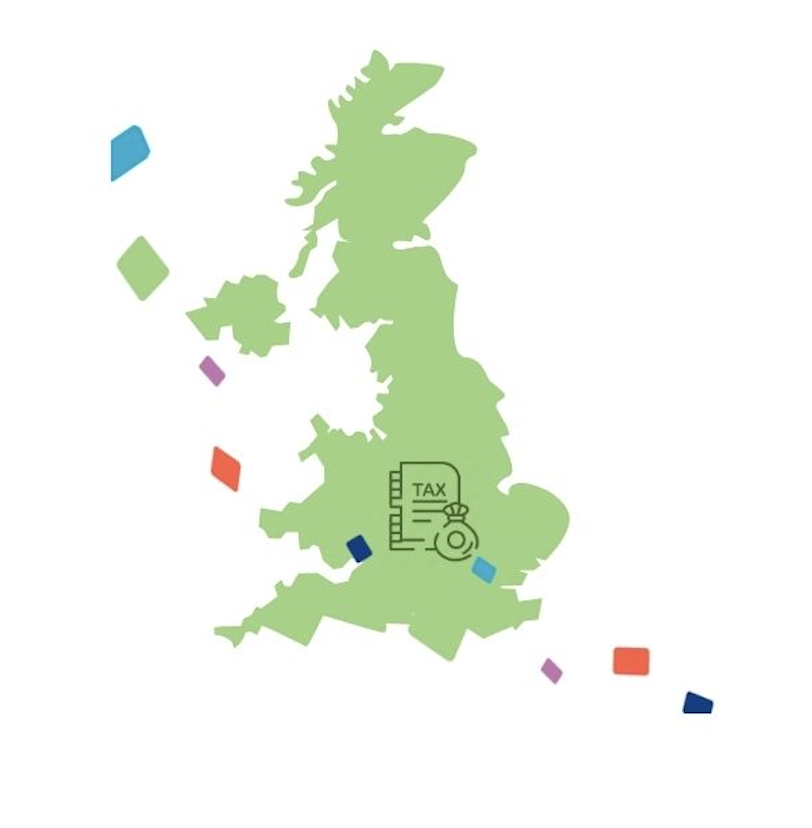Gift Card Taxation In UK: Understanding the Rules and Regulations


by Signe Hegart
October 26, 2023
Gift cards have become increasingly popular as a form of reward and incentive for companies to use across departments. They offer flexibility and choice for recipients, allowing them to choose a gift that suits their preferences. However, it’s important for companies to understand the tax implications of giving gift cards in the UK.
In the UK, gift cards are subject to taxation. Both the employer and the employee may be liable for tax on gift cards, depending on the circumstances. Let’s explore the key points to consider when it comes to gift card taxation in the UK.
Jump to section
Gift Card Taxation In UK
An available tax exemption can help employers ensure that the benefits they offer remain exempt from taxation and are not categorized as reportable employee benefits in kind. To qualify for this exemption, the benefit must meet the following criteria:
- The cost of providing the benefit does not exceed £50 per employee (or the average cost when multiple employees receive gifts).
- The benefit cannot be in the form of cash or cash vouchers.
- The employee must not be entitled to the benefit as part of a contractual arrangement, which includes salary sacrifice agreements.
- The benefit must not be given in recognition of specific services performed by the employee as part of their employment duties.
- If the employer is a ‘close’ company and the benefit is provided to an individual who is a director, office holder, or a member of their household or family, the exemption is limited to a total cost of £300 in a tax year.
- Failure to meet any of these conditions will result in the benefit being subject to regular taxation, except when other exemptions or allowable deductions apply.
Source: Gov.UK
What are gift card taxation laws? ⚖️
Gift card taxation laws refer to the regulations and guidelines that govern the taxation of gift cards in the United Kingdom. These laws determine how gift cards are treated for tax purposes and the obligations that both businesses and individuals have regarding their use.
In the UK, gift cards are subject to certain tax rules that are designed to ensure fair treatment and proper reporting of income. The taxation laws vary depending on whether the gift card is given to an employee or a customer.
For businesses that provide gift cards to their employees as a reward or incentive, these cards are considered a form of taxable income. This means that the value of the gift card is subject to income tax and National Insurance contributions. The employer is responsible for reporting the value of the gift card as part of the employee’s earnings and deducting the appropriate taxes.
When it comes to gift cards given to customers, the taxation laws are slightly different. Generally, gift cards are not subject to VAT (Value Added Tax) at the time of purchase. However, if the gift card is used to purchase taxable goods or services, VAT will be applicable at the point of redemption.
It’s important for businesses to keep accurate records of gift card transactions and ensure they are properly reported for tax purposes. Failure to comply with the gift card taxation laws can result in penalties and potential legal issues.
Understanding the Gift Card Taxation in UK
Gift cards are generally not taxable in the United Kingdom. The tax treatment of gift cards depends on the specific circumstances and the purpose for which the gift cards are given.
If gift cards are given as part of a reward or incentive programs for employees within a company, they are typically considered a non-cash benefit and are subject to tax and National Insurance contributions. However, there are certain exemptions and allowances that may apply.
For instance, if the total value of non-cash benefits given to an employee in a tax year is less than £50, it may be exempt from tax. Additionally, if the gift cards are given as part of a long-service award or in recognition of exceptional performance, they may also be exempt from tax.
It’s important to note that tax regulations can change, so it’s always a good idea to consult with a tax advisor or HM Revenue and Customs (HMRC) for the most up-to-date information and guidance specific to your situation.
Gift Card Taxation in UK for companies with international employees
The taxation rules for gift cards provided by a UK-based company to employees in other countries can be complex and are subject to the tax laws of both the UK and the employees’ respective countries. Here are some important considerations:

UK Taxation
In the UK, gift cards or vouchers provided to employees are typically considered a benefit in kind. This means that the value of the gift card is subject to income tax and National Insurance contributions (NICs) for the employees.
Employers in the UK are responsible for reporting the value of these benefits to HM Revenue and Customs (HMRC) and withholding any applicable income tax and NICs through the PAYE (Pay As You Earn) system.

Employee’s Country Taxation
The tax treatment of gift cards can vary significantly from one country to another. Some countries may consider them as taxable income, while others may provide exemptions or specific rules.
To comply with tax regulations in the employees’ countries, the company should consult with local tax authorities or seek legal and tax advice in each relevant jurisdiction.

Double Taxation Agreements (DTAs)
Some countries have double taxation agreements with the UK to avoid double taxation on the same income. These agreements specify which country has the primary right to tax specific types of income.
The company should determine whether a DTA exists between the UK and the employee’s country of residence. The DTA may provide guidance on which country’s tax rules take precedence.

Reporting and Compliance
Companies should maintain accurate records of the value of gift cards provided to employees and any tax withheld or paid in each jurisdiction.
It’s crucial to stay informed about any changes in tax laws in both the UK and the employees’ countries, as tax regulations can change over time.

Employee Communication
It’s advisable for the company to communicate with employees about the tax implications of receiving gift cards. This transparency can help employees understand their tax obligations and avoid surprises at tax time.

Consult with Tax Professionals
Given the complexities of cross-border taxation, it is highly recommended to consult with tax professionals, including accountants or tax advisors, who have expertise in international tax matters. They can provide guidance on compliance, tax planning, and mitigating tax liabilities.
Read also: How big is the gift card market in Europe? Statistics + Trends
Why are gift card taxation laws important?
Gift card taxation laws are important for several reasons:
- Revenue Generation: Gift cards represent a significant source of economic activity, and the sale of gift cards generates revenue for both businesses and governments. Taxation on gift cards can provide a steady stream of income for local, state, and federal governments.
- Consumer Protection: Taxation laws can help protect consumers by ensuring that the value of gift cards is accurately represented. This includes regulations on expiration dates, fees, and disclosure requirements. When gift card issuers are taxed, they may be more likely to adhere to these regulations.
- Economic Fairness: Taxation on gift cards can promote economic fairness by ensuring that businesses selling gift cards are subject to the same tax regulations as other businesses. Without such laws, there might be loopholes or advantages for gift card sales that could lead to unfair competition.
- Tax Evasion Prevention: Gift cards can be used as a means to evade taxes, as businesses may underreport their income if they don’t properly account for gift card sales. Taxation laws can help prevent such tax evasion by ensuring that these sales are properly accounted for.
- Legal Clarity: Clear taxation laws for gift cards help avoid legal disputes and confusion among businesses, consumers, and regulatory agencies. This clarity makes it easier for all parties to understand and follow the rules.
Related: Gift And Gift Card Taxation in Germany Simplified
Types of gift cards in the UK ????
In the UK, there are various types of gift cards and vouchers that employers can provide to their employees as part of employee rewards, recognition, or incentive programs. Here are some common types:

Retail Gift Cards
These are gift cards that can be redeemed at specific retail stores or online shops. They offer employees the flexibility to choose products or services they prefer. Popular options include Amazon gift cards, Tesco gift cards, and John Lewis gift cards.

These cards allow employees to shop at a variety of retailers. They often include a range of popular stores, making them versatile and appealing.

Entertainment Gift Cards
These cards can be redeemed for entertainment-related experiences, such as cinema tickets, concert tickets, or streaming services. The options include the Cineworld gift card or the Netflix gift card.

Instead of physical gift cards, some employers provide employees with experience vouchers for activities like spa days, hot air balloon rides, or adventure sports. Companies like Virgin Experience Days offer a wide range of experiences.

Some employers provide prepaid debit cards that can be used like regular debit cards. Employees can use them for various expenses or withdraw cash from ATMs. These cards may be issued by banks or financial service providers.

Employers can also create custom gift cards or vouchers tailored to their specific rewards or recognition program. This can include branding and personalized messaging.

Some employers offer employees the option to donate to a charity of their choice on behalf of the company. This is a meaningful way to support causes that are important to individual employees.
Read also: Understanding Gift and Gift Card Taxation In France: A Quick Overview

Send yourself a gift card
Navigating Gift Card Taxation in UK ????
Gift card Taxation in UK can be complex, so it is always a good idea to consult with a tax advisor or HM Revenue and Customs (HMRC) for the most up-to-date information and guidance specific to your situation. However, here are some general guidelines:
1. Income Tax: Gift cards provided as part of rewards or employee recognition programs are generally considered a taxable benefit. The value of the gift card is considered additional income for the employee and should be included in their total taxable earnings. This means that the employee may need to pay income tax on the value of the gift card.
2. National Insurance Contributions (NICs): NICs may also be applicable on the value of gift cards provided to employees. Both the employer and the employee may be responsible for paying NICs on the value of the gift card. The specific rules for NICs can vary depending on the circumstances, so it is important to seek advice from a tax professional.
3. Reporting and Documentation: Employers must keep records of gift cards provided to employees and report the value of these gifts on forms such as P11D or P9D. These forms are used to report taxable benefits provided to employees and are submitted to HMRC.
4. VAT: In some cases, VAT may be applicable on gift cards. If the gift card is for a specific product or service, the VAT rate for that product or service applies. However, if the gift card is for a specific monetary value and can be used for any product or service, VAT is generally not applicable.
It is important for companies to understand the tax implications of providing gift cards to employees as part of a rewards or recognition program. Failure to comply with tax regulations can result in penalties and fines. Consulting with a tax advisor or HMRC can help ensure that companies are following the correct procedures and accurately reporting the value of gift cards provided to employees.
Read also: Global Gift Card Market Size, Growth and Stats 2023-2030
Employers responsibilities in UK when providing gift cards for employees
When providing gift cards or vouchers to employees in the UK, employers have certain responsibilities to ensure compliance with tax and employment regulations. Here are the key responsibilities of employers:
Reportable Benefits
Employers must determine whether the gift cards or vouchers provided to employees qualify as reportable benefits in kind. If they do, the value of these benefits needs to be reported to HM Revenue and Customs (HMRC).
Taxation
The value of the gift cards is subject to income tax and National Insurance contributions (NICs) for the employees if they qualify as reportable benefits. Employers are responsible for calculating and deducting the appropriate tax and NICs through the PAYE (Pay As You Earn) system.
Exemptions and Limits
Employers should be aware of exemptions and limits related to employee benefits. For example, if the value of the gift cards does not exceed £50 per employee (or the average cost when gifts are given to multiple employees), it may be exempt from tax.
Record-Keeping
Employers are required to keep accurate records of all employee benefits, including gift cards. This includes the value of the benefit, the names of the employees who received them, and any tax or NICs withheld.
Communication
Employers should communicate clearly with employees about the tax implications of receiving gift cards. It’s important for employees to understand whether the value of the gift cards will be subject to taxation and how this may affect their take-home pay.
Let’s have a chat
Case studies to illustrate how Gift Card Taxation In UK works in different scenarios
Case 1: Small Business Employee Rewards
Scenario: Sarah runs a small retail business in the UK and wants to reward her five employees with £100 gift cards each for their outstanding performance during the year.
Taxation Details: The cost of providing the gift cards does not exceed £50 per employee, so the gifts are exempt from income tax and National Insurance contributions (NICs). Since the value is within the exemption limit, Sarah’s employees will receive the full £100 gift card value without any tax deductions.
Case 2: Multinational Corporation with Global Workforce
Scenario: XYZ Corporation, a multinational company based in the UK, offers gift cards to its employees across multiple countries, including the UK, the United States, and Germany.
Taxation Details: In the UK, the value of gift cards provided to employees is subject to income tax and NICs, as long as they exceed the exemption limit. The taxation rules for gift cards in other countries may vary. XYZ Corporation needs to comply with the tax laws of each country and ensure proper reporting and withholding according to local regulations.
Case 3: Employee Recognition Program in a Close Company
Scenario: John is the director of a ‘close’ company in the UK. He wants to reward his employees with gift cards worth £200 each as part of an employee recognition program.
Taxation Details: The cost of providing the gift cards exceeds £50 per employee. In this case, the exemption limit doesn’t apply, and the gift cards are subject to income tax and NICs. If the employees are also family members or members of the household of a director in a close company, the exemption is capped at £300 in a tax year. John must report the gift cards to HMRC and deduct the appropriate income tax and NICs from the value of the gift cards.
These case studies demonstrate how Gift Card Taxation In UK can vary based on factors like the cost of the gift, the type of business, and the recipients’ relationship to the employer. It’s essential for both employers and employees to be aware of the applicable taxation rules and exemptions to ensure compliance with tax regulations.
Read also: Gift Card Taxation In Ireland: A Business Guide
Tips for Gift Card Taxation In UK
Here are some tips for handling Gift Card Taxation In UK, whether you are an employer providing gift cards to employees or an individual receiving them:
- Understand the Purpose: Be clear on the reason for giving or receiving the gift card. Different tax rules may apply based on whether it’s a reward, incentive, long-service award, or other purpose.
- Exemption Limits: Familiarize yourself with exemption limits. For example, if the total value of non-cash benefits given to an employee in a tax year is less than £50, it may be exempt from tax.
- Keep Records: Maintain accurate records of all gift cards provided or received. This includes the value of the gift cards, who they were given to, and the reason for the gift.
- Consult a Tax Advisor: When in doubt, seek advice from a tax advisor or HM Revenue and Customs (HMRC). Tax regulations can change, so it’s essential to stay informed.
Conclusion
Understanding Gift Card Taxation in UK is crucial for companies using rewards and incentives across departments. Depending on factors such as the value of the gift cards, the type of business, and the recipients’ relationship to the employer, the taxation treatment can vary. In some cases, such as when the cost of providing the gift cards does not exceed £50 per employee, the gifts may be exempt from income tax and National Insurance contributions (NICs). This means that employees can receive the full value of the gift cards without any tax deductions. However, for multinational corporations with a global workforce or directors of close companies, the taxation rules may be different. It is important for companies to comply with the tax laws of each country and ensure proper reporting and withholding according to local regulations. By being aware of the applicable taxation rules and exemptions, both employers and employees can ensure compliance with tax regulations when it comes to gift card rewards and incentives.
It’s important to emphasize that individuals and businesses should always seek professional assistance and guidance when dealing with Gift Card Taxation in UK. The complexities and nuances of tax regulations can have a significant impact on financial decisions, so consulting with tax professionals or legal experts is strongly recommended to ensure compliance and navigate any potential challenges effectively.



Let’s have a chat
FAQ
Yes, gift cards can be a tax-efficient way to reward employees. In certain circumstances, gift cards may be exempt from income tax and National Insurance contributions. However, it is important to understand the specific rules and regulations that apply to your situation and seek professional advice to ensure compliance.
Yes, when in doubt, it is always recommended to seek advice from a tax advisor or HM Revenue and Customs (HMRC). Tax regulations can change, so it’s essential to stay informed and consult with experts who can provide accurate and up-to-date information.
Yes, it is important to maintain accurate records of all gift cards provided or received. This includes keeping track of the value of the gift cards, who they were given to, and the reason for the gift. These records will be useful for tax purposes and can help ensure compliance with tax regulations.
No, not all gift cards are subject to taxation in the UK. Depending on various factors such as the value of the gift cards, the type of business, and the recipients’ relationship to the employer, the taxation treatment can vary. In some cases, gift cards may be exempt from income tax and National Insurance contributions (NICs) if the total value of non-cash benefits given to an employee in a tax year is less than £50.